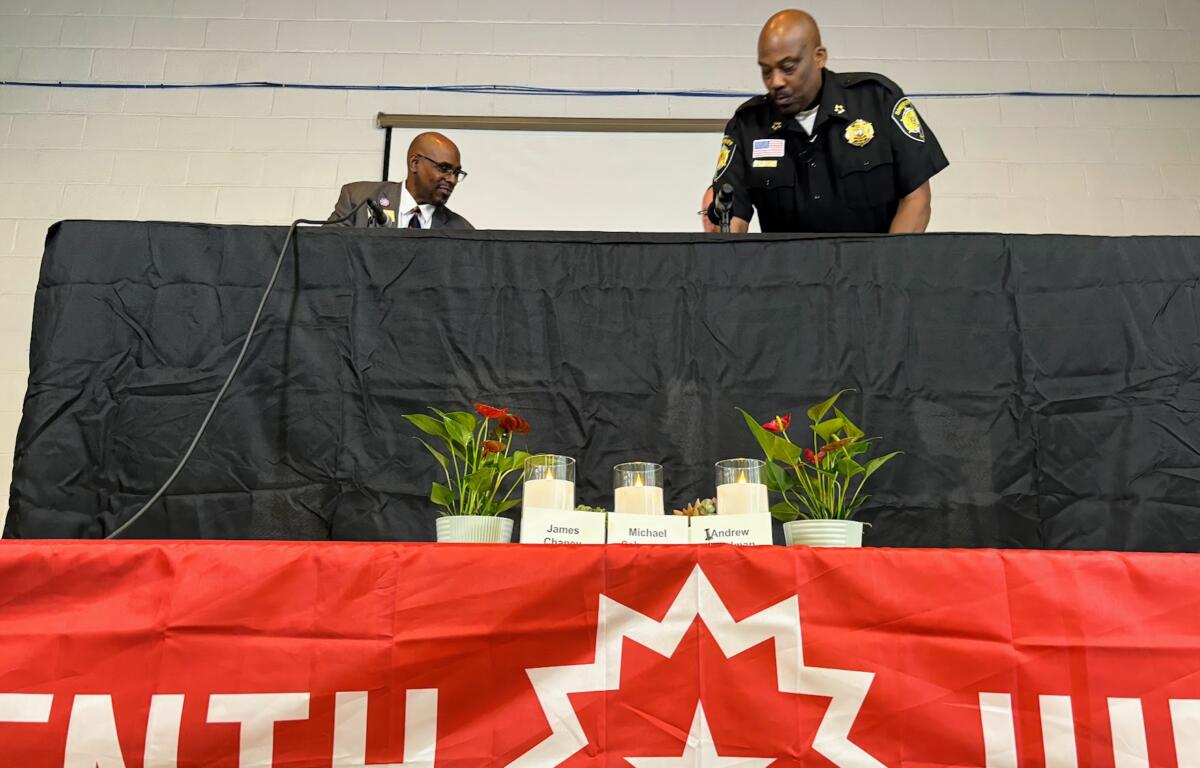ASHEVILLE, N.C. (828newsNOW) —
Lessons on the legacy of three slain Civil Rights workers on Monday helped kick off a “Lunch & Learn” series being held in Asheville this week in conjunction with Juneteenth commemorations.
The City of Asheville has collaborated with the Asheville Martin Luther King Jr. Association to create a program of events all week long. One is a series of presentations called Lunch & Learn, with topics ranging from Black history in Asheville to gentrification.
The series kicked off Monday at the Linwood Crump Shiloh Community Center, located off Shiloh Road in South Asheville.
The session was titled “Honoring the Legacy of Civil Rights Workers: James Chaney, Andrew Goodman and Michael Schwerner 60th Memorial.”
Chaney, Goodman and Schwerner were young Civil Rights activists who were murdered in Mississippi in 1964 during their efforts to help Black citizens register to vote. Chaney was a young Black man while Goodman and Schwerner were Jewish. All three worked for the Freedom Summer Project, organized by the Student Nonviolent Coordinating Committee commonly known as SNCC.
The grief and respect for the trio was represented in the room by about 60 people settled into Shiloh Center folding chairs. Speakers of note included the event host, vice chair of the MLK Association and Mars Hill professor Jonathan McCoy, MLK Association chair Dr. Oralene Simmons, Rabbi Mitch Levine of Congregation Beth Israel and Buncombe County Sheriff Quentin Miller.

Levine stood speaking with attendees before the proceedings got underway.
“It seemed like an appropriate time to reaffirm a Black and Jewish alliance for Civil Rights,” Levine said. “The fight for progress is never done.”
That sentiment was reaffirmed by Miller during his speech. He spoke about the importance of political activism in the Asheville community and his own experiences with fear because of his race. The “Mississippi Burning” victims were pulled over in their vehicle before being killed, which resonated with Miller. He told a story about getting pulled over in his police vehicle for allegedly running a stop sign.
“The sheriff of Buncombe County, the highest-ranking law enforcement officer in this county, is scared to be pulled over,” Miller said. “And you know what? I still can’t find that stop sign.”

The event also featured a Jewish song and prayer for the activists, the lighting of candles in their honor, a voter registration table and a short film about the murders, concluding with the free lunch.
“This is our first one that we’re having,” McCoy said. “Today is a special day for this first Lunch & Learn because we have worked in conjunction with our friends, our neighbors, our fellow Asheville citizens in the Jewish community in remembrance of three young men who unfortunately were killed.”
The remaining Lunch & Learns are scheduled at several spots around Asheville. Each presentation runs from noon to 1:30 p.m. and comes with a free, catered lunch.
- Tuesday, June 18, “First African American Families of Asheville and Buncombe County” will be held at Dr. Wesley Grant Sr. Southside Community Center, 285 Livingston St.
- Thursday, June 20, “Reflections on Gentrification of the African American Neighborhoods” will be held at Burton Street Recreation Center, 134 Burton St.
- Friday, June 21, “Early African American Health Care & Today’s African American Inequities” will conclude the series at Tempie Avery Montford Community Center, 34 Pearson Drive.
More information about Juneteenth, the Lunch & Learn series and other Juneteenth events can be found on the MLK Assocation website, www.mlkasheville.org/events/juneteenth-2024-events/.



